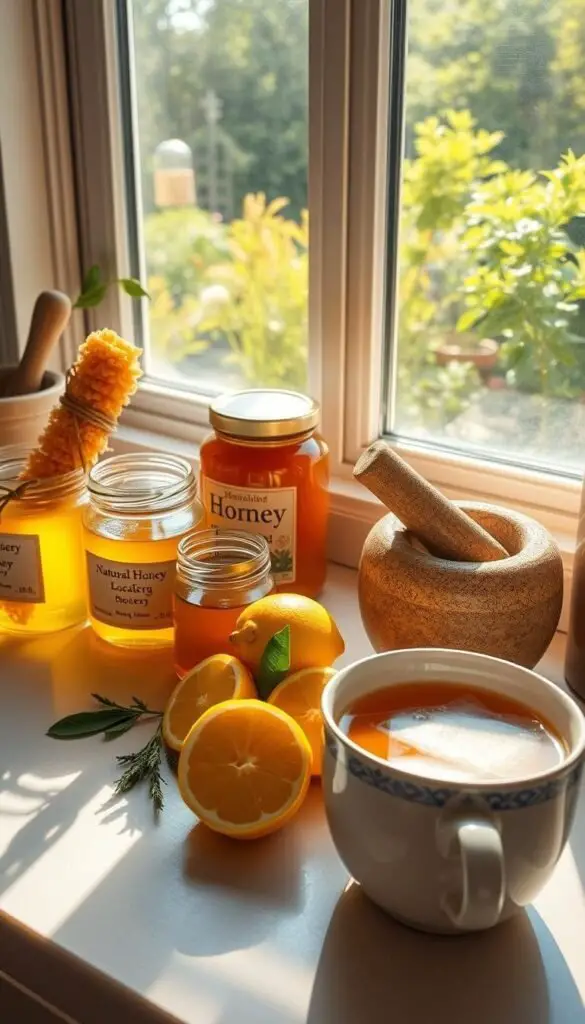(Hey! Some links in this post may be affiliate links — meaning I may earn a small commission if you buy through them, at no extra cost to you. As an Amazon Associate, I earn from qualifying purchases. I only share products I genuinely love and think you’ll find useful too. Read the full disclosure here).
For those dealing with allergy symptoms, finding natural relief is key. Home remedies can offer quick solutions to ease symptoms. This article will look at natural ways to manage allergies, including common triggers and home remedies.
Natural allergy relief is possible. Knowing what causes allergy symptoms is the first step. Home remedies are simple yet effective. They can be added to your daily routine for quick relief and symptom reduction.

Contents
- 1 Understanding Common Allergy Triggers and Symptoms
- 2 Quick Natural Solutions for Immediate Allergy Relief
- 3 The Power of Local Honey and Bee Products
- 4 Essential Oils and Aromatherapy Approaches
- 5 Herbal Teas and Natural Antihistamines
- 6 Home Remedies for Immediate Allergy Relief That Really Work
- 7 Creating an Allergy-Proof Environment
- 8 Dietary Changes to Reduce Allergy Symptoms
- 9 Exercise and Movement for Allergy Management
- 10 When to Combine Natural Remedies with Medical Treatment
- 11 Preventive Measures for Long-term Relief
- 12 Conclusion: Building Your Personal Allergy Relief Strategy
- 13 FAQ
- 13.1 What are the most common indoor allergens?
- 13.2 How can I use local honey to help with my allergies?
- 13.3 What are the benefits of using essential oils for allergies?
- 13.4 How can I create an allergy-proof environment in my home?
- 13.5 When should I combine natural remedies with medical treatment for my allergies?
- 13.6 🌿 More Natural Wellness Tips You’ll Love:
Understanding Common Allergy Triggers and Symptoms
To find good allergy treatment, knowing common allergy triggers and symptoms is key. Allergies can come from many sources, like indoor and outdoor allergens and certain foods. Knowing what triggers them helps people avoid them and find relief from allergies.
Common indoor allergens include dust mites, pet dander, and mold. These can be found in homes, schools, and workplaces. They can cause mild to severe symptoms. Outdoor allergens like pollen and ragweed also cause discomfort. Food allergies, like to peanuts and tree nuts, are very serious and need careful handling.

Managing allergies well means using a variety of allergy relief products. This includes medicines, immunotherapy, and avoiding certain things. Working with a doctor and being proactive can help reduce symptoms and improve life quality.
- Dust mites
- Pet dander
- Mold
- Pollen
- Ragweed
- Peanut and tree nut allergies
Understanding allergy triggers and symptoms is the first step to effective allergy treatment and lasting relief from allergies. With the right allergy relief products and strategies, managing allergies is possible. This way, people can live a healthy, active life.
Quick Natural Solutions for Immediate Allergy Relief
Looking for natural remedies for allergies? There are many options that can quickly ease symptoms. Unlike some conventional treatments, natural remedies avoid harsh chemicals. They are often as effective and have fewer side effects.
Popular natural remedies for allergies include using a neti pot, drinking lots of water, and using a humidifier. These can help with congestion, sneezing, and itchy eyes. Some people also find relief by changing their diet, avoiding trigger foods and eating anti-inflammatory foods.

Other quick fixes include local honey and supplements like quercetin. Honey can help your body get used to local allergens. Quercetin has anti-inflammatory properties. Remember, these remedies might not cure your allergies for good. Always talk to a healthcare professional before trying new remedies, if you have a severe allergy.
Here are some more natural allergy remedies:
- Apple cider vinegar
- Steam inhalation
- Salt water rinses
These can help ease symptoms and offer quick relief. Adding these natural remedies to your daily routine can help manage your allergies and reduce symptoms.
The Power of Local Honey and Bee Products
Many people are looking for natural ways to relieve allergies. Local honey and bee products are gaining popularity. They can help reduce allergy symptoms.
These products can make you less sensitive to local allergens. This is great for those with seasonal allergies. Bee pollen boosts the immune system, which can lessen allergy symptoms. Propolis, a bee product, has antibacterial properties that soothe the body.

To benefit from local honey and bee products, use them regularly. Add honey to your tea or oatmeal. Or, take a bee pollen supplement every day. These allergy relief tips can help lessen symptoms and improve health.
- Use propolis as a throat spray to soothe a sore throat.
- Add bee pollen to smoothies or yogurt for an immune boost.
- Use local honey as a natural sweetener in cooking and baking.
Adding local honey and bee products to your routine can help manage allergies. Always choose high-quality, local products for the best benefits. Say goodbye to annoying allergy symptoms and hello to a healthier, happier you.
Essential Oils and Aromatherapy Approaches
For those looking for natural allergy relief, essential oils and aromatherapy are great options. Oils like lavender and peppermint can help because they have anti-inflammatory and antihistamine effects. They can be inhaled, applied to the skin, or diffused to ease allergy symptoms.
Aromatherapy uses essential oils to help relax and reduce swelling. It’s good for people with allergy symptoms like stuffy noses, itchiness, and sneezing. Adding essential oils to your daily routine can help you feel better and improve your health.
- Eucalyptus oil, known for its decongestant properties
- Tea tree oil, which has antifungal and antibacterial properties
- Frankincense oil, which can help reduce inflammation
These oils can be used in different ways, like in a diffuser or mixed with a carrier oil for skin use. Exploring essential oils and aromatherapy can lead to effective natural allergy relief. It’s a good way to manage allergy symptoms proactively.
Herbal Teas and Natural Antihistamines
Looking for home remedies for allergies? Herbal teas and natural antihistamines can help. They work by lowering histamine, which causes allergic reactions. Adding these to your allergy treatment plan can ease symptoms and boost your life quality.
Some top herbal teas for allergy relief are:
- Nettle leaf tea, which has natural antihistamine properties
- Butterbur tea, which has anti-inflammatory properties that can help reduce swelling
- Chamomile tea, which has a calming effect on the body and can help reduce stress
Drink these teas alone or mix them with other home remedies for allergies for best results. Also, think about adding natural antihistamines like quercetin or vitamin C to your allergy treatment plan.

Exploring these natural remedies can help you manage allergies better. Whether used alone or with other home remedies for allergies, herbal teas and natural antihistamines offer effective relief.
Home Remedies for Immediate Allergy Relief That Really Work
For those looking for relief from allergies, home remedies can be a big help. These simple solutions can quickly ease allergy symptoms. They are a great addition to allergy relief products. Natural remedies found at home can be very effective.
Some top home remedies for allergy relief include:
- Salt water rinses to clear nasal passages
- Steam inhalation to loosen mucus
- Apple cider vinegar to reduce inflammation and alleviate symptoms
These remedies are easy to use and work fast. They are perfect for those seeking relief from allergies. Adding these home remedies to your daily routine can lessen your need for allergy relief products. It’s a natural way to manage allergies.

Trying these home remedies is a great first step towards relief from allergies. It can also improve your life quality. Always talk to a healthcare professional before trying new remedies. This is important, even more so if you have a severe allergy or are on medication.
Creating an Allergy-Proof Environment
To manage allergies well, we need to reduce exposure to common allergens. Using natural remedies like reducing dust mites at home is key. Washing bedding and stuffed animals in hot water and using allergen-proof mattress covers can help.
Getting rid of pet dander is also important. Bathing pets often, using HEPA air purifiers, and keeping pets out of certain areas helps. These steps can greatly reduce exposure to pet dander and other allergens.
It’s also important to watch out for outdoor allergens like pollen. Check pollen counts before going outside and wear a mask when it’s high. These habits can help create a space that eases allergy symptoms and cuts down on medication needs.

Using natural remedies and making your environment allergy-proof can help find an allergy cure. Remember, everyone’s allergies are different. It might take some trying to find what works best for you.
Dietary Changes to Reduce Allergy Symptoms
Changing your diet can help with how to relieve allergies. Eating the right foods can ease allergy symptoms and boost your health. A diet full of anti-inflammatory foods is a smart allergy relief tip.
Include foods high in omega-3 fatty acids like salmon and sardines. Also, add turmeric to your meals. It has curcumin, a strong anti-inflammatory.
- Dairy products, which can trigger allergic reactions in some people
- Gluten, which can cause inflammation and worsen allergy symptoms
- Processed foods, which can contain allergens and irritants
By changing your diet and following these allergy relief tips, you can lessen allergy symptoms. Always talk to a healthcare professional before big diet changes.
With some planning, you can make a diet that fights allergies. Start by adding anti-inflammatory foods and skipping trigger foods. See how it can help with how to relieve allergies and better your health.
Exercise and Movement for Allergy Management
Regular exercise is key for health and helps manage natural allergy relief and allergy symptoms. It boosts heart health, strengthens the immune system, and lowers stress. This can help ease allergy symptoms. It’s important for people with allergies to find indoor exercises, mainly during high pollen times.
Yoga is great for reducing stress and improving breathing. Swimming, cycling, or using a treadmill are also good choices. These activities can enhance health and offer natural allergy relief by fighting inflammation and boosting the immune system.
Breathing techniques are also helpful in managing allergy symptoms. Deep breathing can lessen stress and anxiety, which can worsen allergies. Techniques like diaphragmatic breathing, box breathing, and alternate nostril breathing can calm the mind and body. This can lessen allergy symptoms and promote natural allergy relief.
Adding regular exercise and breathing techniques to your day can help manage allergy symptoms and achieve natural allergy relief. Always talk to a healthcare professional before starting new exercises or breathing programs, if you have severe allergies or health issues.
When to Combine Natural Remedies with Medical Treatment
For those looking into home remedies for allergies, knowing when to mix them with medical treatment is key. It’s important to talk to a healthcare professional, mainly for severe allergies. They can create a allergy treatment plan that fits your needs, using both natural and medical options.
At times, mixing natural remedies with medical treatment can work well. For instance, using home remedies for allergies like steam inhalation or nettle leaf tea with prescription meds can ease symptoms. But, always check with your doctor to make sure it’s safe and effective.
Here are some situations where both natural and medical treatments might be helpful:
- Severe allergic reactions that need quick medical help
- Chronic allergies that natural remedies can’t fully manage
- Allergies caused by many factors, like the environment and food
By working with a healthcare expert, you can find a mix of home remedies for allergies and medical treatment. This way, you get a complete allergy treatment plan that meets your specific needs and improves your health.
Preventive Measures for Long-term Relief
For those looking to ease allergy symptoms, taking preventive steps is key. By focusing on long-term relief, you can cut down on your need for allergy products. Start by cleaning regularly to get rid of allergens, using HEPA filters, and keeping your space clean and dust-free.
It’s also important to prepare for different seasons. This means keeping windows closed during pollen season, using air purifiers, and avoiding outdoor activities when pollen is high. Knowing the local pollen counts and weather can help you plan your day better.
- Creating a cleaning schedule to reduce allergens in the home
- Using allergy-friendly bedding and laundry detergent
- Avoiding strong perfumes and fragrances that can trigger allergy symptoms
By making these habits part of your daily routine, you can find relief from allergies. This means you’ll need less allergy relief products, making your life better overall.
Conclusion: Building Your Personal Allergy Relief Strategy
Finding relief from natural remedies for allergies needs a plan made just for you. Learn what works best for your allergy cure. Mix natural solutions, change your diet, and take steps to prevent allergies. This way, you can manage your symptoms and live better.
Keep in mind, what works for one person might not work for you. So, be patient and try different things to find what works best. Stick to your plan and talk to a doctor if your symptoms get worse.
With the right approach, you can beat your allergies and live a healthier life. Use natural remedies, eat wisely, and make your space allergy-free. You deserve to feel better.
Want longer-lasting allergy relief? 🌿 Learn how essential oils, herbal remedies, and diet changes can help tackle allergies naturally in our full guide: How to Tackle Spring Allergies with Natural Remedies.
FAQ
What are the most common indoor allergens?
Common indoor allergens include dust mites, pet dander, and mold.
How can I use local honey to help with my allergies?
Eating local raw honey can help your body get used to local allergens. It can also help ease allergy symptoms.
What are the benefits of using essential oils for allergies?
Essential oils like lavender and peppermint can help. They have anti-inflammatory and antihistamine properties. You can use them by inhaling, applying topically, or diffusing.
How can I create an allergy-proof environment in my home?
To make your home allergy-proof, reduce dust mites and eliminate pet dander. Also, avoid bringing in outdoor allergens like pollen.
When should I combine natural remedies with medical treatment for my allergies?
Always talk to a healthcare professional before mixing natural remedies with medical treatment. This is true for severe allergies. It ensures you’re getting the safest and most effective treatment.










